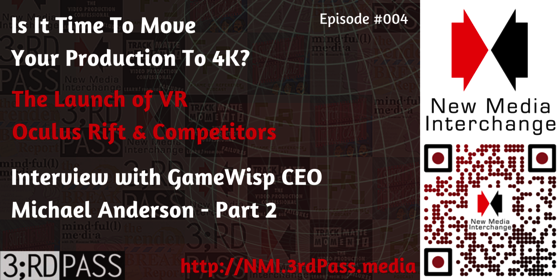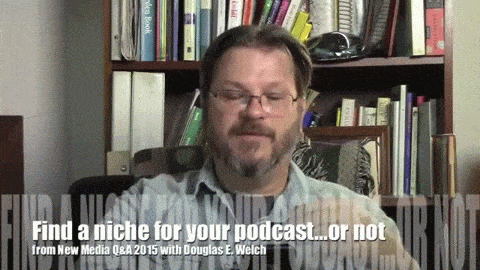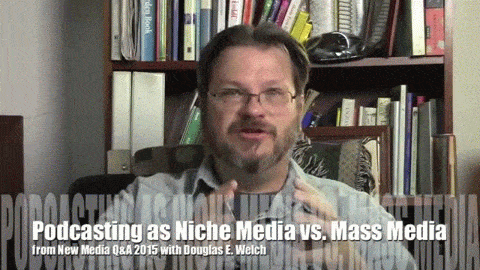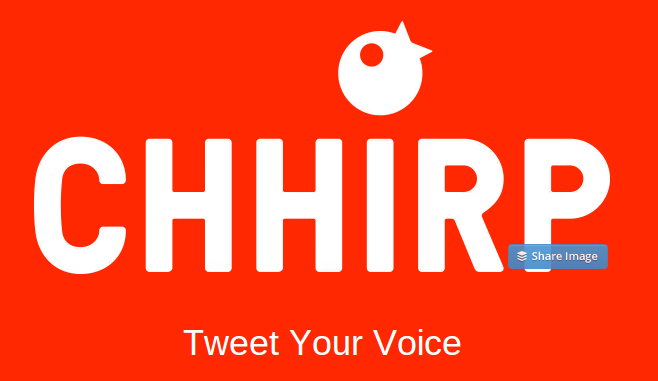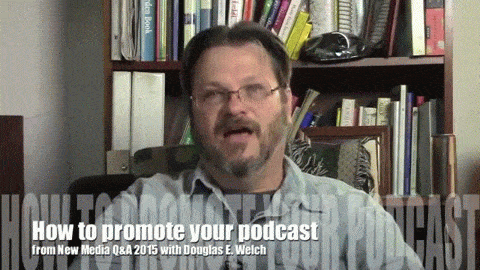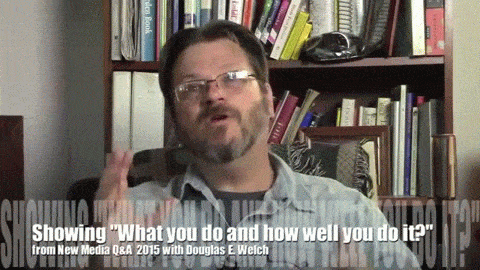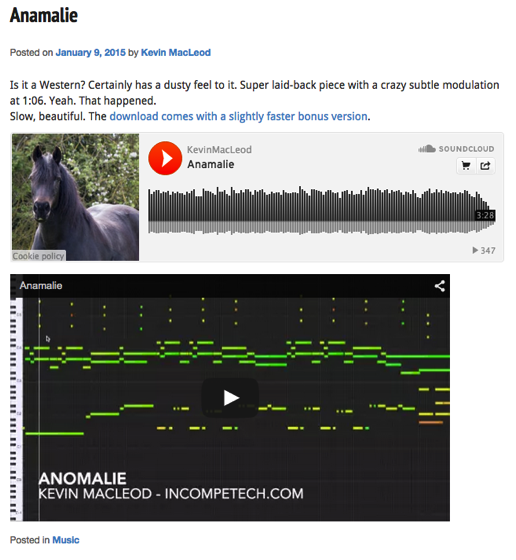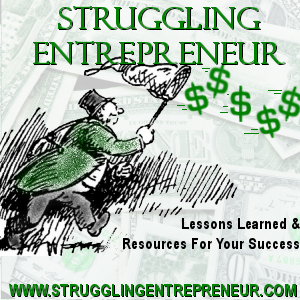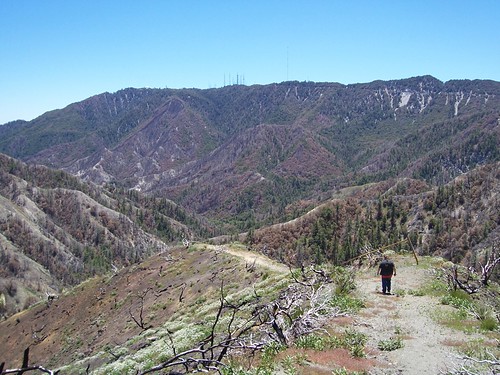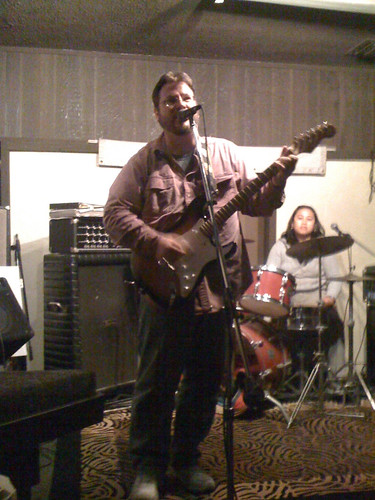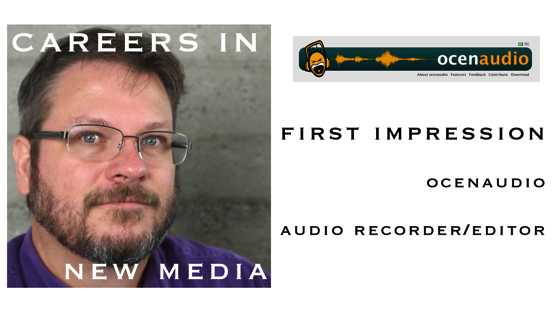New Media interchange, my new show with 3rd Pass Media, is now available on iTunes.

Subscribe Via iTunes
New Media Interchange is a podcast spotlighting various developments in New Media & focusing on the media world beyond mainstream television and radio, including podcasting, YouTube, live streaming, gaming and more. Hosted by Douglas E. Welch , pioneer podcaster, blogger and new media consultant.

Listen to HBO, Silicon Valley and TwitchTV, Media fragmentation, Meerkat and Periscope and more!
New Media Interchange is part of the 3rd Pass Media Network which is launching a series of shows this week including Mindul(l) Media, The Render Break Report, New Media Interchange and More. You’ll find more information about 3rd Pass Media at http://3rdPass.Media.

HBO, Silicon Valley and TwitchTV, Media fragmentation, Meerkat and Periscope and more!
This is New Media Interchange where we talk about the media world beyond mainstream television and radio, including podcasting, YouTube, live streaming, gaming and more. I’m your host, Douglas E. Welch, pioneer podcaster, blogger and writer.
In today’ show…
- HBO’s Silicon Valley takes their show directly to the gamer audience via TwitchTV,
- Video Killed The Television Star: Why Total Fragmentation Is The New Norm
- Meerkat and Periscope put live streaming in your hand
I’ll round out the show with a book review of video game storytelling and the next installment of my Subscribed series.
More after this…
Today’s show is brought to you by Audible.com. I love New Media like podcasting and YouTube, but I also love all types of books. If you love audio books you can support New Media Interchange and 3rdPass Media by starting your free 30-day trial with Audible today. Choose from over 100,000 books. Including one of my favorites, The Hobbit. Visit AudibleTrial.com/3rdpass or use the link in the show notes today.


SFX: Silicon Valley Trailer Clip
HBO’s Silicon Valley takes their show directly to the growing gamer audience via TwitchTV
A recent article in The Verge details how HBO is taking their newest comedy, Silicon Valley, directly to an existing audience that is probably predisposed to watch it — the viewers of Amazon’s TwitchTV streaming service that focuses on all types of gaming related content. These TwitchTV viewers likely already understand the joys of “cable-cutting” or freeing themselves from cable television subscriptions in lieu of “over-the-top services” like Twitch, YouTube, Netflix and now, HBO Now..
For me, this move makes a great deal of sense. Through Twitch, HBO can reach an audience that almost directly matches their desired audience. Through HBO, Twitch expands its programming beyond game play and into other aspects of their members’ lives. HBO also gets a chance to give Twitch users a taste of what they might be able to watch if they subscribe to HBO Now — content that was unavailable except via cable television until very recently. As The Verge article states, HBO is using “video games as a trojan horse” and getting their content in front of “roughly 100 million monthly active users” of Twitch. It is my bet that it will prove to be great promotion for everyone involved — HBO, Twitch and the users of both sites.
I imagine we’ll see more and more collaborations like this between all the players in what I call the “alternative TV” market. As the choice of content and services increases, discovery of exciting new content grows more difficult. Users can be overwhelmed with choice, but “giving them a taste” of content has always been a way to gather new viewers and it will continue to be important long into the future. Video content producers still need to find receptive audiences, as HBO has done here, but the opportunities for these collaborations in new and unique ways will continue to grow.
Video Killed The Television Star: Why Total Fragmentation Is The New Norm
All this collaboration, cross-over and cooperation between various content providers continues to push the fragmentation of the television and online video content market and David Armano over at the Logic+Emotion blog has written posts detailing exactly how this is happening and the trends he sees being created. First came DVRs, then YouTube, then other online video services signalled the end of television’s stranglehold on video entertainment. It gave consumers more choice over the type of content they wanted to view and provided the technology to time shift entertainment so viewers could watch what they wanted, when they wanted it. They didn’t need to rely on the curation and control that was wielded by mainstream media anymore.
Once the technology advanced to a certain degree — with relatively easy-to-access high speed Internet and software — content creators and providers immediately saw the opportunities it presented. Once content was available in significant quality and quantity, users quickly began to explore and enjoy the viewing options they had and — despite claims to the contrary — began cutting the cord more and more frequently.
For myself, I haven’t had a cable television subscription for several years now, opting to use broadcast to watch the few mainstream shows I do watch and a combination of YouTube, Netflix and other online video sources for the remainder of my viewing. Even though I am older than the target demographic for cord cutting, I have no problems leaving the “vast wasteland” of mainstream television behind, now that I have plentiful options. I can imagine that younger viewers, who tend be be a bit more tech savvy find it even easier to explore the myriad of options available. For me, the fragmentation of the industry is a welcome change and one I think will provide more unique and diverse content than ever before. There is a whole new entertainment world out there and I plan on taking great advantage of it.
While YouTube, Netflix and the other current “big boys” of online video content will continue to thrive in the coming years, even they are seeing competition and fragmentation in the form of live streaming sites like TwitchTV, and smartphone apps that put streaming in the hands of anyone with a smartphone.
SFX: Music Bed
…and that thought leads us into our last story for this episode…
Meerkat and Periscope put live streaming in your hand
In the last couple of weeks there has been an explosion in the mobile live streaming space with first the indie app, Meerkat, exploding to life during this year’s South by Southwest (SXSW) conference followed closely by recent Twitter acquisition, Periscope. Both of these apps all offer nearly one-touch live streaming from your smartphone or tablet and use Twitter as the main discovery and interaction source, with streams being announced immediately via Twitter and interactive chat messages, in the form of Tweets, overlaid right on the video stream. The release of these two services caused a veritable flood of live streams with everyone testing out the services and how they might be able to use them. Things have settled down considerably since launch, but I am still seeing quite a bit of activity in my Twitter stream.
For me, live streaming is a special use case. While I wouldn’t use it everyday, it can be dramatically useful during special events or breaking news stories to give immediate and alternative views a forum for the event. Other content creators thrive on live streaming. Both they and their audience love the immediate interaction via Twitter or chat room. it does indeed bring a much different feel to a show which is quite different from pre-recorded videos such as those on YouTube and elsewhere.
It will be a while before we see exactly where Meerkat, Periscope and other live streaming options fit into the overall online video market, but I think we can all be certain that we will see other, similar apps in the near future.
You can read more about Meerkat and Periscope in the articles linked in the show notes.
Is Meerkat winner-take-all?
Periscope, Twitter’s answer to Meerkat-style live streaming, is now available
The Race To Make Everyone A Livestreamer
Angry Joe and Nintendo
In a follow up on our story from last episode about Nintendo claiming copyright and advertising revenue from YouTubers who share their game play, it looks like the company finally forced one major YouTube personality, Joe ‘Angry Joe’ Vargas to give up on them entirely. Vargas boasts nearly 2 million subscribers on YouTube, a significant audience in the gaming space.
In a multi-part, self-titled “Rant” Vargas details how much money he has spent on Nintendo products and how much time he has spent sharing and promoting their devices and games and his extreme disappointment in the company’s YouTube policies. He has decided to totally drop the playing, recording and reviewing any of Nintendo’s devices and games rather than deal with constant copyright claims or joining Nintendo’s Creators Program which takes 40% of a YouTuber’s revenue for the right to post and share Nintendo games and doesn’t cover usage of all Nintendo games, only a portion.
You can find all of Angry Joe’s Nintendo rants, and all his other game reviews and game play videos on his YouTube Channel – AngryJoeShow.
YouTuber Angry Joe Swears Off Nintendo Videos After The Company Claimed His Mario Party 10 Take
Also in the news this week:
HBO Now Live on Apple TV
HBO’s over-the-top service HBO Now launched this week exclusively on Apple TV and Apple mobile devices for 3 months. Fans of Game of Thrones and other HBO shows can finally get them, legally, without a cable television subscription, for $15 a month.
Roku 3 Media Streaming Box adds new remote with with voice search
Along with Apple TV and Google Chromecast there are other streaming media players out there on the market, including the somewhat lesser known Roku 3. Press releases report the Roku has added a new remote to this device which allows you to do Voice Search to find shows over about 17 major apps, including Netflix, Amazon Instant Video, and Hulu Plus.
Pixar’s Renderman released for free
Now anyone with a powerful enough computer can use the same animation software used to create PIxar movies like Toy Story for their non-commercial projects. This follows on the release of various gaming engines like UnReal Engine 4 and Unity in free non-commercial use versions. And also better licensing options that allow independent game makers to use the software for free up to certain levels of earnings.
Links to all these stories are in the show notes
SFX: Music Bridge – “Theme for Harold (var. 3)” by Kevin MacLeod (http://Incompetch.com) under Creative Commons License
Book Review: Video Game Storytelling: What Every Developer Needs to Know about Narrative Techniques by Evan Skolnick
Check out the book on Amazon.com


At first glance, an outsider to the world of video games might see little relation between a major motion picture and a video game. They seem to be different genres, different worlds, even when movies crossover to become games and games crossover and are developed into movies — often badly. The action, the interactivity, the immersion of video games can make their stories seem unlike a standard narrative program. Surely, due to the player’s control of characters, video games can’t be written in the same way as a television script. While that might be true in some regards, when you go deeper into the creation of story that drives the final narrative, there are more similarities between writing for film and video games than you might imagine. These similarities also mean that many similar challenges exist for these writers regardless of their genre.
Writer Evan Skolnik is an international speaker and educator who conducts workshops on storytelling techniques and has worked on large scale video game projects such as Star Wars 1313, Marvel: Ultimate Alliance 2 and Spiderman 3.
The first half of Video Game Storytelling would be familiar to anyone who has ever taken a film writing course. It discusses the “three act structure”, “The Hero’s Journey” and the Monomyth that are the basis for many of our most classic books and films like Star Wars and Alien. Skolnick uses these well-known films to illustrate various writing concepts but then expands his examples with examples from well-known video games and how they also use these same techniques. These games include the Bioshock series, Uncharted and Metal Gear Solid. Thankfully, just as with movies, many scenes and playthroughs of these games are easily available via YouTube. This allows the reader to familiarize themselves with games they may have never played and fully understand the lessons Skolnick references.
While there is a good deal of video game examples spread throughout this first half, I found myself wishing for even more examples of how the traditional writing and storytelling rules applied to video games.
The second half of Video Game Storytelling details the many disciplines involved in creating a video game and how each of these affects — and is affected by — the narrative tools he has illustrated in the first half. For incipient video game developers this is where they will find the “meat” of the book and the majority of the author’s expertise. The information found in the first half might be found in any good book on screenwriting, but the detailed breakdown of all the video game development disciplines, their challenges and their relationship to the narrative of any video game should probably be required reading for anyone considering a career in video game design and development.
In the “In the Trenches” section, Skolnik details the responsibilities of each important discipline including Game Character Development, Level and Mission Development, Environments, Audio and several others. He also details how a video game writer needs to work with each of these disciplines in order to create a well-balanced, successful, and most importantly playable video game.
Throughout Video Game Storytelling you will see and hear a complaint common to any collaborative writing and creative enterprise — the lack of inclusion, if not outright respect, for the creator of the narrative of a game. There are several common mistakes in dealing with a writer, whether in traditional media such as television or film or the relativly younger video game industry. Skolnick lays out the biggest mistakes creative teams can make with their narrative experts i.e. writers. These mistakes can range from not hiring a writer at all for your game to hiring a writer but then not giving them the power and support to defend the narrative from the competing demands of all the disciplines mentioned above. Too often writers are given all the responsibility for the narrative, but very little power to defend that narrative. This can often translate into taking much of the blame for a less-than-successful game, even when many of the narrative decisions were taken out of their control.
Skolnik’s best advice when hiring a video game writer can be summed up as — hire as early as possible in the development process, integrate them fully and equally with all the other disciplines and teams, listen to their guidance about the narrative. A game developer is paying their writer for their experience, advice, and knowledge. They should then take it. Too often, though, that is not the case. The writer — and the narrative — get shunted aside by cool gaming mechanics, great explosions and intricate AI characters.
One of the main reasons I requested a review copy of the book from Blogging for Books is so I could better familiarize myself with game development and be able to discuss it more intelligently with my high school aged son, who is looking at a career somewhere in the game development industry. As I read the book, I found myself reading him some of the stories and ideas out loud and also encouraging him several times to read the book as soon as I had completed it. I think there is a great deal of knowledge to be gained from both sections of the book. The “Basic Training” section gives an excellent introduction into the world of the Three-Act Structure and the second half applies that knowledge in very concrete ways specific to video game development. It is a great starting point for learning about an industry — video gaming — that is rapidly becoming a huge entertainment industry on the level of traditional television or film.
SFX: Far Lands or Bust Opening Clip
Subscribed
Today in my Subscribed series is Far Lands or Bust. This series is where I highlight those Podcasts, blogs and YouTube Channels I subscribe to and watch regularly.
Years ago my son, Joseph, was just getting into online gaming and his introduction to that world was the now common gateway drug of Minecraft. In Minecraft and online in multi-user worlds he found a great collection of people. I was almost universally surprised and happy with the quality of folks he found there, which made me feel more comfortable with allowing him to play more video games as he grew up.
His interest also developed my own interest in Minecraft both as a player and viewer of Minecraft-related content. He shared his favorite YouTube personalities and their channels with me and they became — and remain — a significant part of my online video viewing. Far Lands or Bust and its creator, KurtJMac was one of my first subscriptions.
Far Lands or Bust is a series of Minecraft videos with a good cause. Like a virtual walkathon, Kurt is walking to the “Far Lands” of Minecraft and raising money for the Child’s Play charity. He has raised over $269,000 so far with his travels. The show is combination of various things. It’s a travelogue as he walks through his Minecraft world, a bit of a video blog, and as some people see it — an audio podcast with some pretty scenery. As he walk and has adventures in the Minecraft world, Kurt talks about gaming-related topics as well as his other interests including space exploration and astronomy.
Each season, Kurt hosts a marathon live stream as the culmination when he and the viewers reach their fundraising goal for Child’s Play. This brings in special guests, special live episodes of Far Lands or Bust, group gameplay in Minecraft and other games and, typically, a lot of fun and laughter.
Kurt also does a host of other video shows, some are Minecraft related but he also enjoys a variety of driving games and loves to check out quirky, artistic or just plain odd games from independent game publishers. You can find everything at FarlandsorBust.com or on his YouTube Channel KurtJMac. You’ll find links in the show notes.
Far Lands or Bust
KurtJMac on YouTube
SFX: Music Bed
That’s it for this episode of New Media Interchange where I talk about the media world beyond mainstream television and radio, including podcasting, YouTube, live streaming, gaming and more.
Some music written and produced by Kevin MacLeod at Incompetech.com and used under Creative Commons License by the author.
New Media Interchange is part of the 3rd Pass Media network. For more information, visit 3rdPass.media. Do you have questions or comments? Send them along to NMI@3rdpass.media or via Twitter at @NMIPodcast .
I’m Douglas E. Welch and I’ll be back next week with more New Media news on New Media Interchange..
***

